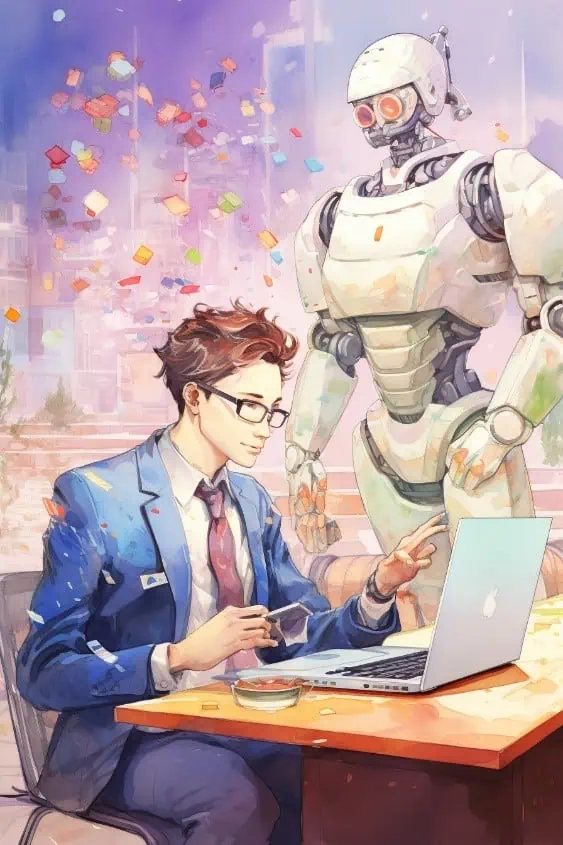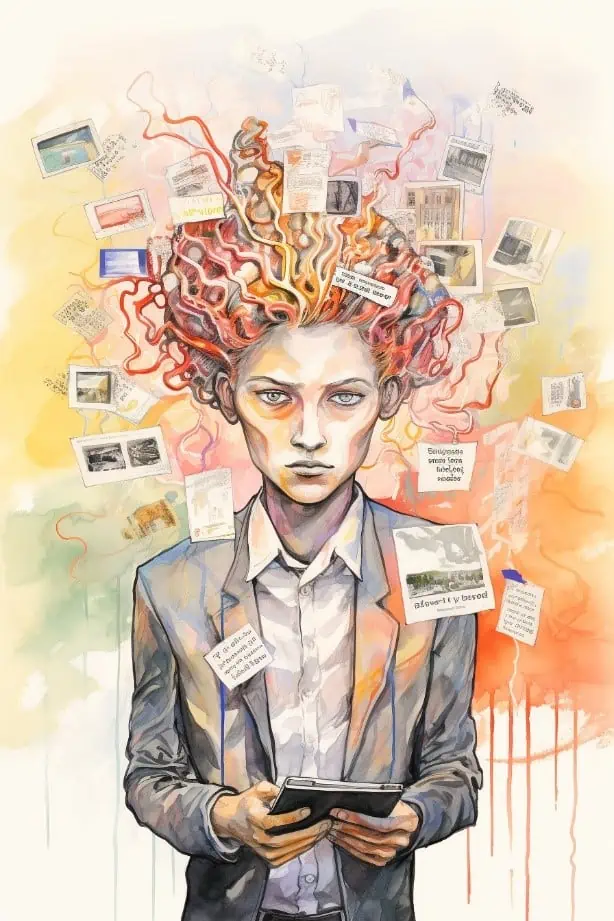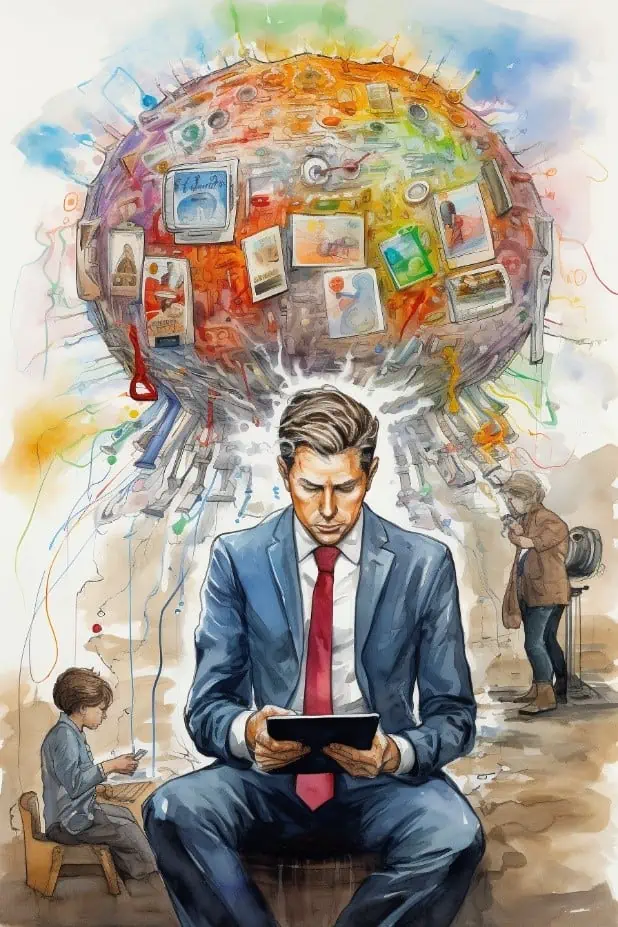

Have you ever wondered why your news feed seems to read your mind? As you mindlessly scroll through your phone to unwind after a long day, you find stories that align so perfectly with your interests that it feels like your news app is eavesdropping on your thoughts. That's AI-curated news feeds for you – a blend of convenience and clairvoyance, but at what cost?
Today, we’ll take a look at the intricate world of AI-curated news feeds and what this development means for us all. How do algorithms manage to provide you with news that keep your eyes glued to the screen? And how is this AI-driven personalization shaping our views of the world?

What are AI-curated news feeds, you ask? Think of a chef who knows exactly what you like. He serves dishes that feel exclusively made for you. That's exactly what AI does when it comes to the news you read or view.
AI in news media uses algorithms to sift through your digital footprints – it analyzes your past interactions, preferences, and even the duration you spend on various news topics. This process then tailors your news feed to mirror your unique interests.
Why do they do this? If the algorithms can pique your interest, then you will spend more time-consuming news on their platform. A win for them, but is it a win for you too?
Remember the days of browsing through a newspaper or waiting for the evening news on TV? That was the era, where news was a universal experience. However, this experience has shifted dramatically. Now, AI-driven news feeds have transformed news consumption into a very personalized experience.
Have you noticed a change in how we digest news? Well, it's not just your imagination. Recent findings from the Pew Research Center paint a clear picture: there's been a notable 20-25% uptick in daily engagement with news since AI stepped into the picture. This isn't merely about reading more. We interact on a deeper level with the content we consume.
But there's another side to this story. While AI-curated feeds keep us more plugged in, they also guide us toward a limited selection of news sources. Data from the Nieman Journalism Lab indicates a 10-15% reduction in the variety of news sources people explore post AI-adoption. This shift toward a more uniform set of news sources is a subtle, yet impactful, consequence of how AI reshapes our access to information.

If you thought that this increase in getting our news from a limited number of sources had no effect on our psychology and beliefs, I have a bad surprise for you. There are two main offenders when it comes to the psychological effects of news personalization that are on the rise:
Have you ever felt like your news feed knows you a little too well? This is no wonder since AI-curated news feeds subtly create digital echo chambers. These chambers reflect back our own beliefs, feeding us news that aligns perfectly with our existing views. It’s as if we’re in a room where the walls whisper back our own thoughts. While this might feel reassuring, it often prevents us from encountering diverse viewpoints and leads to a more limited perspective of the world.
Closely linked to these echo chambers in media is the phenomenon of confirmation bias. This is our mind's natural inclination to believe and seek out information that reinforces our pre-existing beliefs.
A notable study by the American Psychological Association sheds light on intriguing media consumption patterns: users of AI-curated news feeds have shown a 30% increase in the tendency to gravitate towards news that echoes their ideological leanings. This isn’t just about staying in familiar territory. It’s more like wearing blinders that narrow our view of the world and make us more prone to one-sided stories.

Have you noticed a shift in what kind of news catches your eye? AI is subtly but surely altering our news consumption habits. A striking figure from the Journal of Communication indicates a 40% surge in the consumption of news that aligns with individuals' political beliefs after they start using AI-curated feeds. This uniformity in the type of news can narrow our view of the world and reinforce existing divisions.
This change in consumption has a significant impact: an increase in political polarization. Research from Stanford University brings a key insight to light. It shows a 25% rise in political polarization that can be traced back to the news feed algorithms. Our online reading habits are not just shaping our news preferences; they're also coloring our political views and contribute to a more fragmented and divided society.

You might be wondering what it looks like when someone is stuck in this echo chamber. Well, at our latest family BBQ, my Uncle Joe was passionately arguing about a headline he read. He was claiming that a small town had discovered a “fountain of youth” water source.
Trying to convince him to consider other news sources, or even think about how this would be possible on a physical and chemical level, was like persuading a cat to enjoy a bubble bath – highly unlikely. Sounds like a humorous story, but it paints a clear picture of how our digital echo chambers can cement our beliefs – no matter how outlandish they may seem.
Think of your AI-curated news feed as your personal movie trailer editor. It's great at giving you the action-packed headlines you love, but what about the slow-burn, thought-provoking stories? Just like sticking to one movie genre, a one-track news feed can keep us from the full story spectrum. It's a bit like only watching thrillers and never knowing the charm of a classic romance.
Nowadays, AI-curated news are everywhere. We often find ourselves bombarded with misleading or sensational news. This steady stream of skewed stories can stir up significant anxiety and mistrust among us.
Think about it: when you’re bombarded with exaggerated or false news, doesn't it sometimes twist your view of reality and leave you feeling unsettled or even doubtful? The impact on mental health is substantial. It doesn’t just touch on individuals but even on the very fabric of our communities.
But it's not just about stress and anxiety. The psychological influence of these AI-generated news loops goes deeper. The echo chambers in media and the confirmation biases they create can intensify negative feelings and beliefs. This situation often leads to a society that's more divided and less understanding of each other. It's important, now more than ever, to be mindful of these hidden impacts on our mental health as we sift through our digital news feeds.
One way to combat the effects of AI-curated news is to consciously diversify our news sources. Stepping out of our comfort zones and exploring a variety of news outlets can provide a more balanced view of the world. This practice not only broadens our perspectives but also helps in developing critical thinking skills. These are essential in discerning truth from misinformation.
Why not turn this into an experiment? For a week, try reading news from sources outside your usual preferences. This venture into “enemy territory” can be enlightening and expose you to different viewpoints. It might even challenge your preconceived notions and help you understand other peoples’ perspectives on the matter you’re reading about. It's like a palate cleanser for your news diet. You get a fresh perspective on the world.

Have you ever wondered what's behind the AI that curates your news? It's vital to understand these algorithms. Knowing how they work and their potential biases empowers us to navigate the news with more insight and caution. This understanding is a step towards consuming news more intelligently and responsibly.
With AI becoming a staple in newsrooms, the spotlight is on ethical journalism. This new era calls for journalists and media houses to stick firmly to accuracy, fairness, and impartiality. After all, the trustworthiness of our news hinges on these principles. Futuristic journalism should not be left in the (unsupervised) hand of AI.
This blog post isn't the end but the beginning of an important conversation. As readers and consumers of news, your participation in discussions about AI's influence on news curation and its wider societal implications is vital.
So, over to you, dear readers. How have AI-curated news feeds shaped your view of the world? Ever ventured out of your news comfort zone to broaden your perspective? What is your personal opinion on the impact of AI on journalism?
In contemplating the “tailored” reality AI news feeds offer, let’s think about this: Are we getting a complete picture of the world, or just slices that mirror our own biases?
